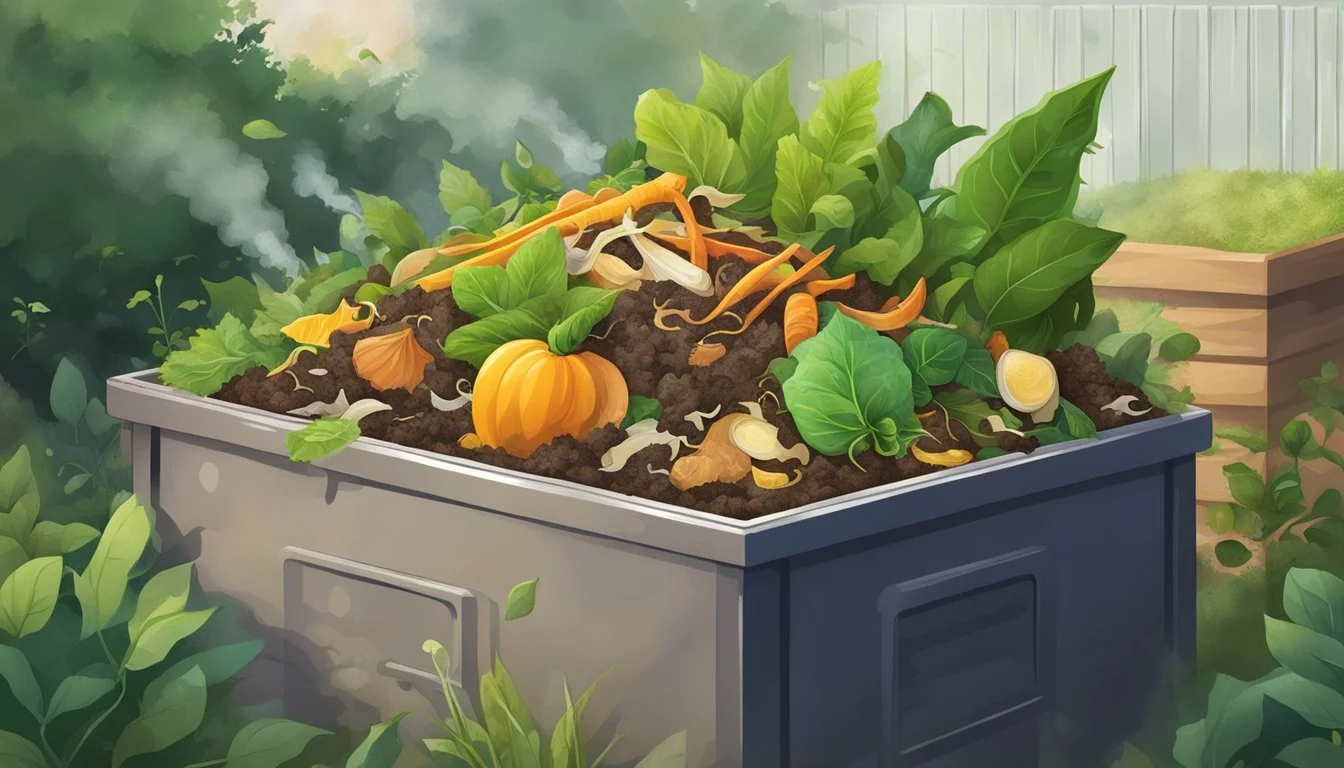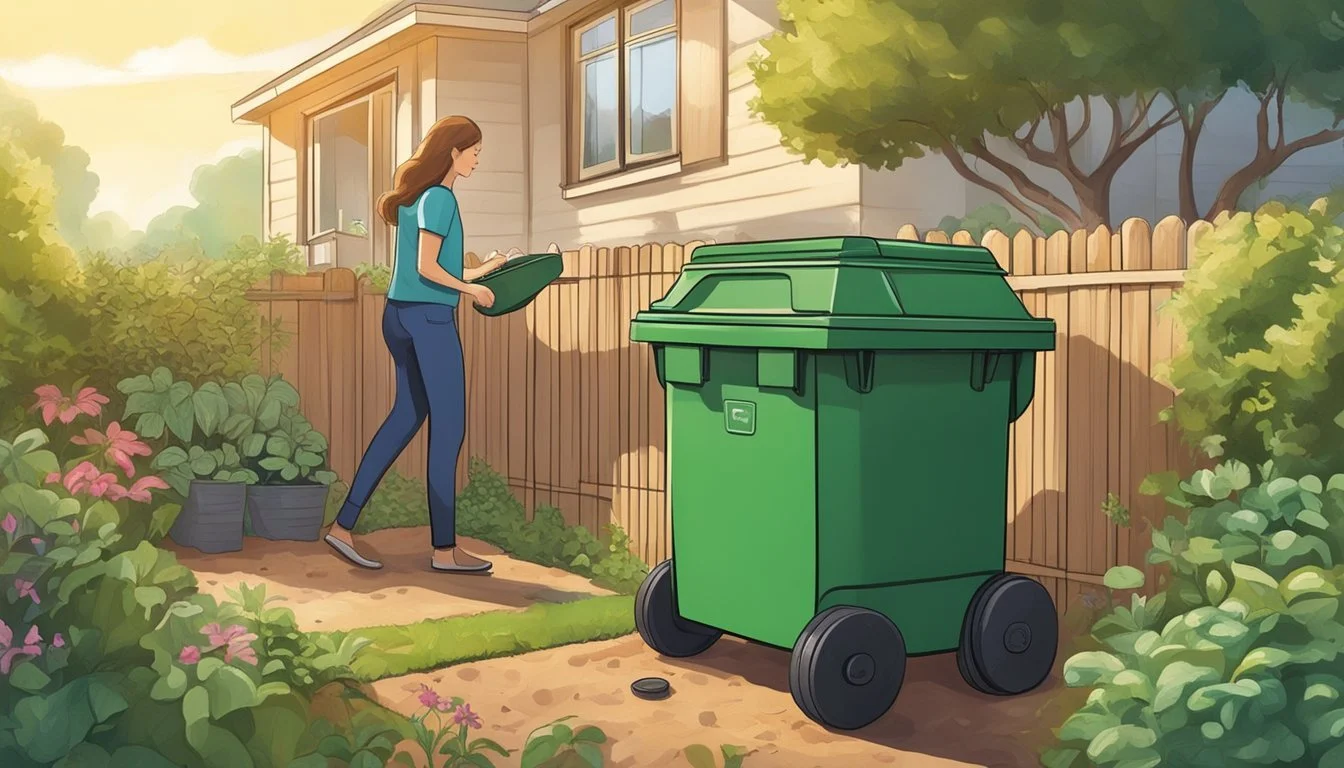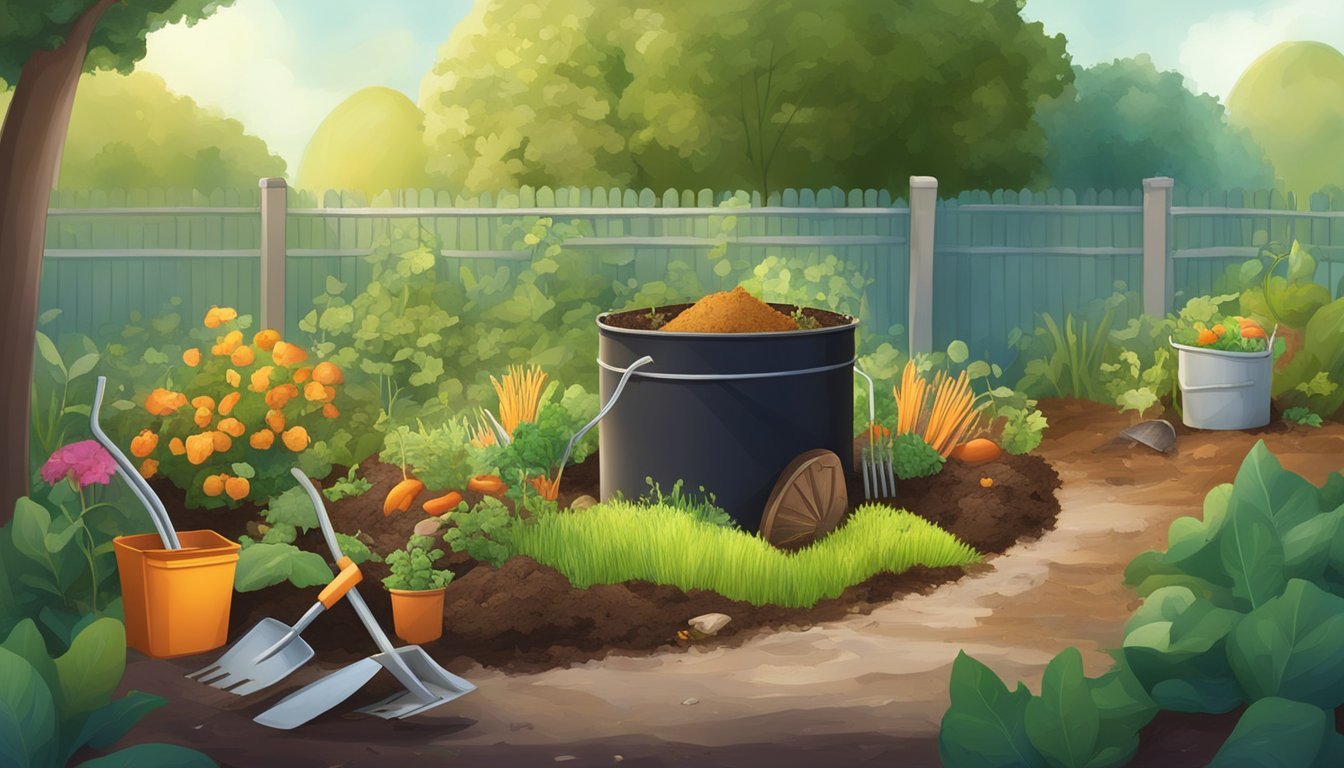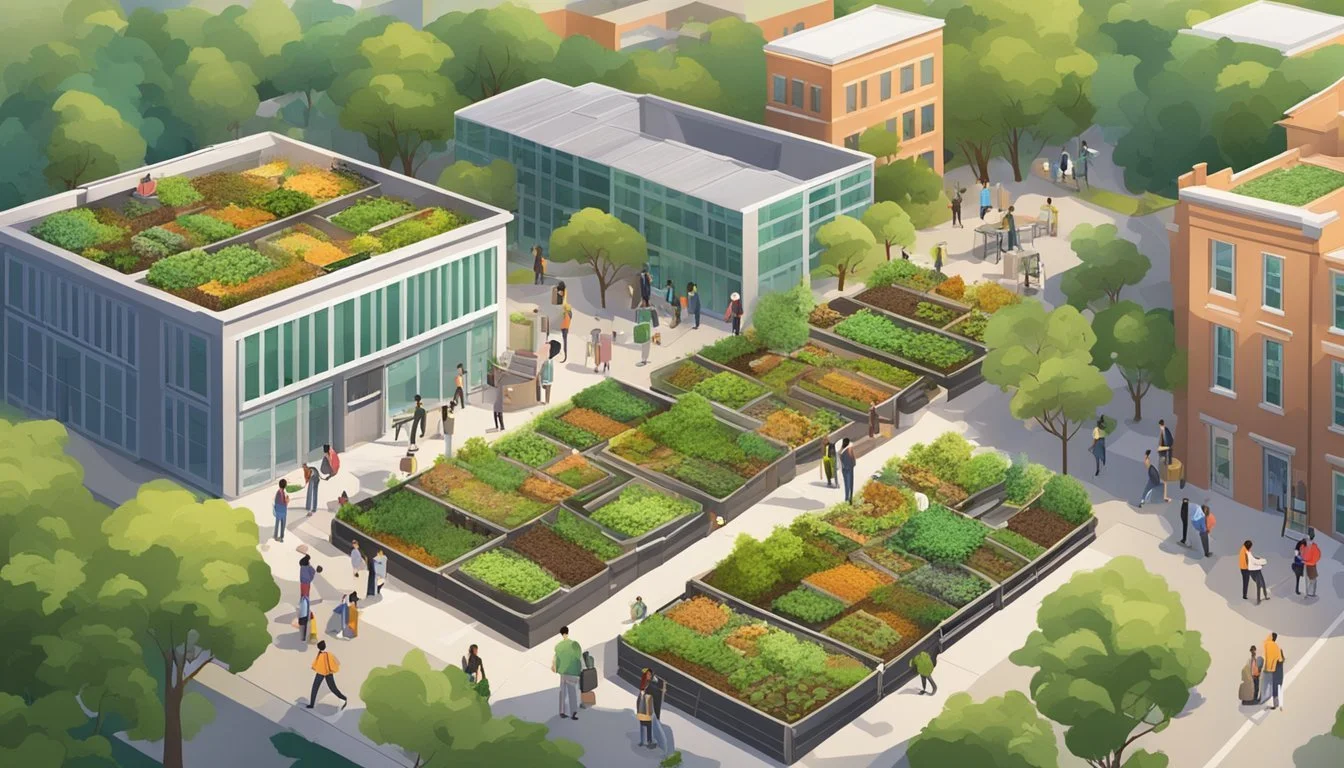Guide to Composting in College Station, TX
Sustainable Waste Reduction for Aggie Community
Composting offers a natural method to recycle organic materials, turning waste into a nutrient-rich soil amendment that benefits the environment and promotes sustainability. The process involves the decomposition of organic matter, such as leaves, kitchen scraps, and grass clippings. In College Station, Texas, residents have embraced composting as an eco-friendly practice to manage yard and kitchen waste effectively, aiding in community efforts to reduce landfill use and cut down greenhouse gas emissions.
The city of College Station encourages its citizens to participate in responsible waste disposal through composting. The local government and educational institutions provide resources and education to help individuals understand the fundamentals of starting and maintaining a compost pile. With initiatives like Don't Bag It™ - Compost It!! and support from Texas A&M University's AgriLife Extension Service with their Easy Gardening: Composting guide, there's a wealth of information at hand for both beginners and seasoned composters.
These composting efforts are not confined to individual households but extend to the broader College Station community. Businesses such as Happy Earth Compost highlight an increasing interest in sustainable waste management. They represent a growing trend towards a greener lifestyle in this Texan city, showcasing the potential for composting to play a significant role in fostering a healthier environment for future generations.
The Basics of Composting
Understanding the fundamentals of composting equips individuals in College Station, TX, with the knowledge to transform organic waste into valuable soil amendments. Through composting, the decomposition process is harnessed to recycle organic matter back into the soil, enriching it and supporting environmental health.
What Is Composting?
Composting is the natural process of recycling organic matter, such as leaves, vegetable scraps, and lawn clippings, into a rich soil amendment known as compost. Microorganisms, fungi, and other decomposers break down these materials in controlled conditions to accelerate the decomposition process. The end product, compost, is full of nutrients that help plants grow and thrive in the soil.
Benefits of Composting
Composting presents multiple benefits to the environment and the community in College Station, TX. It reduces the amount of waste sent to landfills and lowers greenhouse gas emissions associated with waste decomposition in those settings. Compost also enhances soil structure, improves moisture retention, and supplies essential nutrients to crops and gardens. Furthermore, engaging in composting practices supports the local ecosystem by returning valuable organic matter to the soil.
What to Compost
In College Station, a successful compost pile requires a balance of carbon-rich "browns" and nitrogen-rich "greens," while avoiding materials that could cause harm or attract pests.
Greens and Browns
Greens provide nitrogen, a critical element for composting. These include:
Vegetable scraps: Carrot tops, lettuce, and other vegetable remains.
Fruit waste: Apple cores, banana peels, and spoiled fruits.
Coffee grounds: A nitrogen-rich addition that also includes paper filters.
Tea leaves: Loose leaves or tea bags (if the bags are compostable).
Grass clippings: Freshly cut grass, which should be mixed well to avoid clumping.
Yard trimmings: Green leaves and plant cuttings.
Browns supply carbon and include:
Dry leaves: Collected from fall yard cleaning.
Newspaper: Shredded to avoid matting, and non-glossy papers are preferable.
Cardboard: Not wax-coated, torn or shredded.
Eggshells: Crushed to speed up decomposition.
Both greens and browns are essential as they work together to create a hospitable environment for microorganisms that break down organic matter.
Items to Avoid in Your Compost
It's important to know what not to include:
Meat: Attracts pests and can cause odor issues.
Dairy products: Similar to meat, can attract unwanted pests and create odors.
Compostable items: Not all are suitable for backyard composting and may require industrial composting facilities to break down effectively.
By carefully selecting the right materials for composting, College Station residents can produce rich soil amendments to enhance their gardens and landscapes.
Setting Up Your Composting System
When embarking on the composting journey in College Station, it's crucial to select a suitable compost bin, identify the optimal location, and maintain the proper balance of moisture, heat, and aeration.
Choosing a Compost Bin
The first step in establishing a composting system is to choose an appropriate Compost Bin. In College Station, options range from purchased, ready-to-use bins to homemade solutions. Consider the size of your Garden or Yard when selecting the bin—it should be proportional to the amount of organic waste generated. Texas A&M Agrilife Extension Service provides insights into composting processes that can guide your choice.
Location and Set-Up
Location is paramount for a successful compost setup. Position your Compost Bin or Compost Pile on well-drained soil in an area with a balance of sun and shade. This supports proper decomposition and helps maintain needed Heat. Ensure that the spot is convenient for adding scraps and turning the pile, but also out of the way of daily activities.
Maintaining Proper Conditions
Moisture, Heat, and Aeration are the trifecta of an effective composting process. Aim for a Carbon to Nitrogen Ratio of about 30:1, layering "greens" with "browns" to provide the optimal nutrient balance. Consistently aerate the pile to speed up decomposition. The pile should be kept moist but not wet, as excess water can smother the microorganisms at work. Eartheasy Guides & Articles gives great advice on maintaining compost moisture. Regularly turning the compost will help distribute Heat and Moisture evenly throughout the pile.
Troubleshooting Common Issues
When managing a compost pile in College Station, TX, common issues such as unpleasant odors, pests, and improper moisture levels can arise. Addressing these challenges effectively enhances the composting process and ensures a successful transformation of organic materials into nutrient-rich soil.
Odor Management
Composting is a naturally odor-free process if maintained correctly; however, one may encounter smelly compost due to an imbalanced carbon-to-nitrogen ratio or lack of airflow. Solutions involve adjusting this ratio—adding more brown materials like dried leaves or straw to increase carbon or green materials like fruit peels to boost nitrogen. It is also critical to regularly aerate the compost to reduce odors and facilitate decomposition.
Pest Control
Insects and small rodents are attracted to compost piles if food items are not properly covered. They prefer easy access to food scraps, such as fruit and vegetable peelings. To deter pests, cover fresh additions with a layer of soil or finished compost, and use a compost bin with a secure lid. Also consider incorporating practices such as a three-bin system to isolate fresh waste from more mature compost, minimizing the attraction for pests.
Moisture Levels
The right moisture level is essential for microorganisms to break down organic materials efficiently. The compost should feel like a wrung-out sponge—moist but not dripping. If the compost is too wet and appears slimy, add dry brown materials. Conversely, if the compost is too dry, integrate green materials or sprinkle water lightly to achieve the desired moisture. Regular monitoring and adjustments maintain the required balance for optimal composting conditions.
Composting in College Station
Composting in College Station provides eco-conscious residents the opportunity to enrich their gardens while reducing waste. The city offers various supports for composting, including guidelines, resources, and community programs.
City Guidelines and Resources
The City of College Station underscores the importance of composting as an eco-friendly alternative to sending organic waste to the landfill. Residents looking to start composting can refer to Solid Waste & Recycling Services provided by the city, which includes information on waste reduction and recycling services. To assist with composting efforts, the city's website, cstx.gov/curbside, serves as a source for residents to understand how to properly separate their compostables from regular trash and recycle materials.
Community Composting Programs
Community garden initiatives and composting programs play a vital role in College Station's approach to waste reduction. These programs, often run by local organizations or Texas A&M University extensions, encourage participation by providing education and communal composting spaces. For example, Texas A&M AgriLife Extension's Don't Bag It™ - Compost It!! program educates on composting techniques and benefits. They create avenues for residents to contribute to composting without needing personal garden space.
Participation and Contribution
Taking part in College Station's composting movement is open to all, from individuals with home composting setups to those contributing to community composting efforts. The College Station Curbside program encourages residents to set aside organic waste for compost. These contributions to city or community compost heaps help in creating nutrient-rich soil, which can be used to support local agriculture and landscaping projects. Through active participation, residents play a crucial role in the city's environmental sustainability initiatives.
Environmental Impact and Sustainability
Composting offers a strategic approach to manage organic waste in College Station, TX, with significant benefits for the environment and sustainability. This natural process supports the city's ecological goals by diminishing landfill use, decreasing greenhouse gas emissions, and instilling sustainable habits among its residents and students.
Reducing Waste and Landfill Use
In College Station, the practice of composting can play a critical role in reducing waste that ends up in landfills. By transforming organic matter such as food scraps and yard waste into nutrient-rich compost, the community can significantly lessen the volume of garbage sent to landfills. This, in turn, helps to prolong the operational lifespan of existing landfill sites, which are filling up at an alarming rate. For more information on reducing waste through composting, individuals can refer to Texas A&M University's "Don't Bag It - Compost It!!" initiative.
Lowering Greenhouse Gas Emissions
Composting organics is not only beneficial for waste reduction but also for lowering greenhouse gas emissions. Normally, when organic material is disposed of in a landfill, it decomposes anaerobically and produces methane—a potent greenhouse gas with more than 25 times the impact of carbon dioxide on climate change. Composting, on the other hand, is an aerobic process that significantly reduces the production of methane, thereby helping to minimize the community's carbon footprint. The U.S. Environmental Protection Agency outlines the importance of composting in managing food waste and reducing greenhouse gas emissions on their "Composting" page.
Promoting Sustainable Practices
Lastly, composting in College Station not only addresses immediate environmental concerns but also promotes sustainability on a broader scale. By diverting waste from landfills and producing compost that can amend soil, the practice encourages the creation of a circular economy where nothing goes to waste. This reflects a commitment to the planet's health, as composting enriches the soil, supporting plant growth and restoring vital ecosystems. These efforts contribute to building a more sustainable future for the Earth. To learn more about this positive cycle, citizens may explore resources like the United Nations Environment Programme's guide on "How composting can reduce our impact on the planet".
Advanced Composting Techniques
Advanced composting techniques enhance the efficiency and benefits of traditional composting methods. They cater to the needs of different scales, from the backyard gardener to large-scale operations, often resulting in better-quality compost that can serve as a potent fertilizer and mulch.
Vermicomposting
Vermicomposting utilizes worms, typically red wigglers, to accelerate the decomposition process. The worms convert organic waste into nutrient-rich castings, an excellent fertilizer for conserving moisture and suppressing weeds when used as mulch. This method is suitable for small-scale operations like home gardens and can even be done indoors, supporting organic farming by creating a natural, potent boost for plants.
Bokashi Composting
Bokashi composting is an anaerobic process that ferments organic waste, including dairy and meats, which are usually not recommended for traditional composting. During the bi-weekly collection of kitchen scraps, Effective Microorganisms (EM) are added to the waste to expedite fermentation. The result is a pre-compost that can then be incorporated into a soil system or a traditional compost pile to further break down, eventually enriching the soil with beneficial nutrients.
Large-Scale Composting
For entities such as municipalities and large organic farms, large-scale composting systems are critical. These systems can handle bi-weekly collections of larger quantities of organic waste. Techniques vary from windrow composting, where long rows of compost are turned regularly, to in-vessel composting, which accelerates decomposition in a controlled environment, potentially mitigating greenhouse gas emissions. This large-scale process converts substantial amounts of waste into valuable organic fertilizer, contributing to the sustainability of organic farming.
Conclusion
Composting in College Station, TX, represents a practical action towards a more sustainable future. Not only does it reduce the waste sent to landfills, but it also enhances soil quality, supporting local agriculture and gardening efforts. Initiatives such as the Don't Bag It™ program emphasize the importance of composting and provide residents with the information they need to start their own composting practices.
Home composting has gained traction, thanks to educational programs highlighting its ease and benefits. Residents can turn ordinary kitchen and yard waste into a rich soil amendment through simple steps. Structured programs and guides from Texas A&M AgriLife Extension underscore the value of incorporating materials like leaves, grass clippings, and vegetable scraps into compost bins.
Community involvement is crucial. Collective efforts can lead to more substantial environmental impacts. Through cooperative agreements, such as those announced by the USDA for community compost, College Station can scale up its composting practices.
Composting supports a circular economy—where waste becomes a resource. The involvement of local governments, educators, and residents is essential in fostering this eco-friendly mindset, ensuring the city continues on a path to a greener tomorrow. Those looking to participate in home composting or community compost initiatives can utilize the resources available to start making a difference today.










